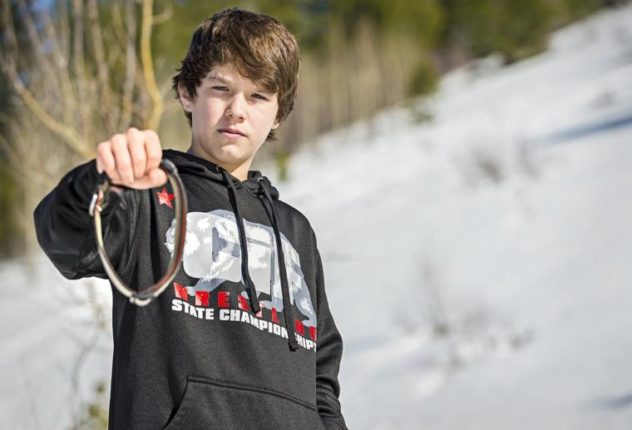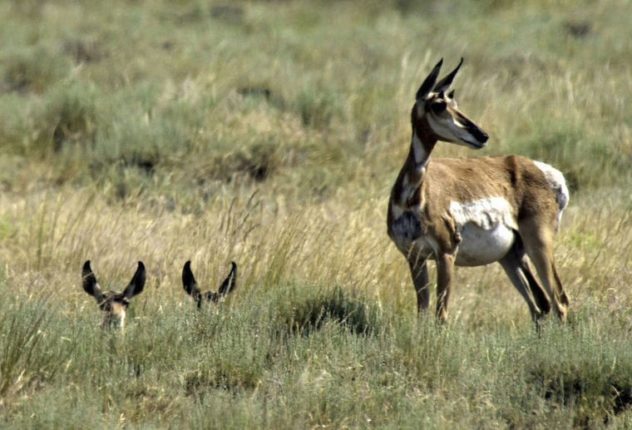An Eastern Idaho couple has sued the U.S. government a year after a predator-killing trap that federal workers mistakenly placed near their home doused their 14-year-old son, Canyon, with cyanide and killed their dog.
Mark and Theresa Mansfield, of the Pocatello area, filed the lawsuit Monday in U.S. District Court in Idaho.
“We’re filing it because we want justice and we want to continue to make people aware of this (issue),” Theresa said.
The Mansfields are seeking more than $75,000 in economic damages and more than $75,000 for pain and suffering.
In the months following the incident, Theresa said they spent thousands of dollars for medical tests and treatments to determine if their son was OK, and they lost wages in the process.
They’ve never received any reimbursement from those responsible, she said. In addition, they lost their hunting dog, a 3-year-old Labrador, who was worth about $8,000, but was considered priceless to them, she said.
The Mansfields son, Canyon, then 14, was playing with the dog last year when he triggered the trap that the U.S. Department of Agriculture placed to kill coyotes. The dog started convulsing and then died.
Canyon had trouble sleeping for a month after the event and experienced vomiting and headaches. And the memory of watching his dog die has stayed with him over the past year.
“Whenever I think of that hill or hear the word ‘cyanide’ I think of that moment when (the dog) was freaking out and didn’t know what was going on,” Canyon told the Journal earlier this year. “That will probably stay with me my entire life. Every time I hear the word ‘cyanide’ it will trigger that memory and will be something I’ll never really get rid of.”
The devices, called M-44s, are embedded in the ground and look like lawn sprinklers but spray cyanide when they are set off. They are meant to protect livestock but sometimes kill pets and injure people. They killed about 12,500 coyotes in 2016, mostly in the U.S. West.
The traps drew increased scrutiny after The Associated Press reported that the teen was injured months after the government decided to stop using the devices on federal lands in Idaho. U.S. officials have said the cyanide trap was placed in error.
They said several months after the incident that they would expand a review of the traps, which are still used in other states. They also issued guidelines requiring federal workers to notify nearby residents of the devices’ placement.
Todd Grimm, Idaho director of the U.S. Department of Agriculture’s Wildlife Services, didn’t return a call Tuesday seeking comment on the lawsuit.
“While playing and throwing a toy for his dog,” the lawsuit said, the boy “noticed a pipe protruding from the ground that he thought looked like a sprinkler pipe. When he reached down and touched the pipe, it exploded with a loud bang.”
The lawsuit says an orange substance covered the boy’s clothing and got in his left eye and that he used snow to wipe off the substance. The boy then saw his dog convulsing and foaming at the mouth.
He ran home to get his mother, but when they returned the dog had died.
Since the incident, the Mansfields and others have been pushing for change through lawsuits and proposed legislation. Many of them would like to see M-44s banned.
But Theresa is frustrated that few changes have occurred over the last year. She says they still don’t know what the long-term effects will be for their son and she worries that the next child won’t be so lucky.
She hopes the lawsuit they filed Monday will not only lead to some compensation for her family, but also continue to shed light on an important issue.
“(We want to) continue to bring awareness to cyanide bombs,” Theresa said, adding that she wants people to keep fighting for change. “If we don’t keep fighting, (they may put them) back behind all of our houses.”
In a separate lawsuit by environmental and animal-welfare groups, U.S. officials in March agreed to complete a study on how two predator-killing poisons could be affecting federally protected species.
The settlement requires the U.S. Fish and Wildlife Service to complete consultations with the Environmental Protection Agency by the end of 2021 on the poisons that federal workers use to protect livestock on rural lands. One of the poisons is the cyanide used in M-44s.





